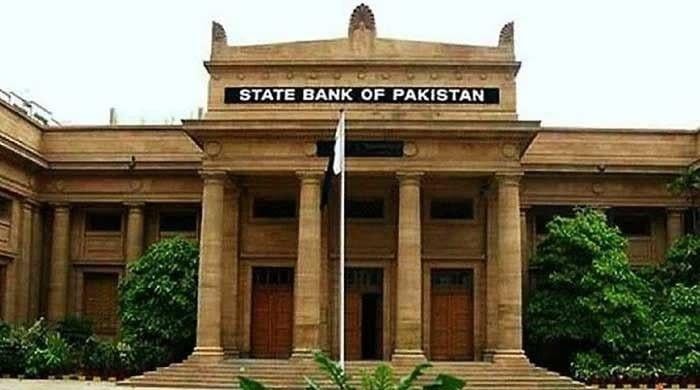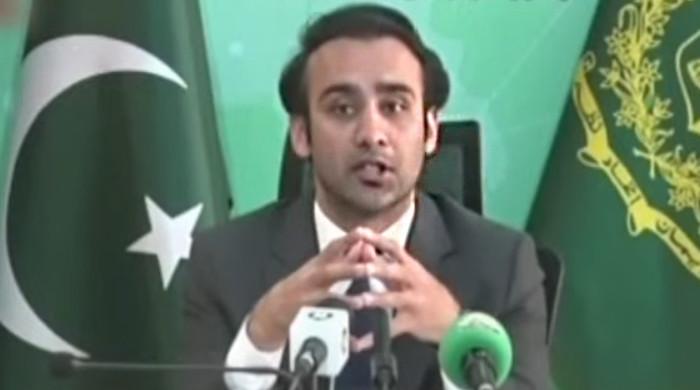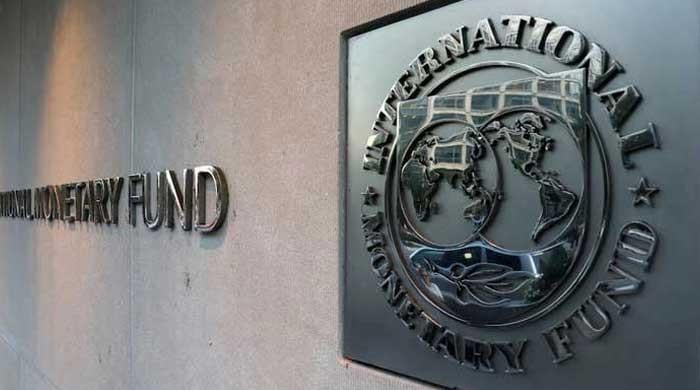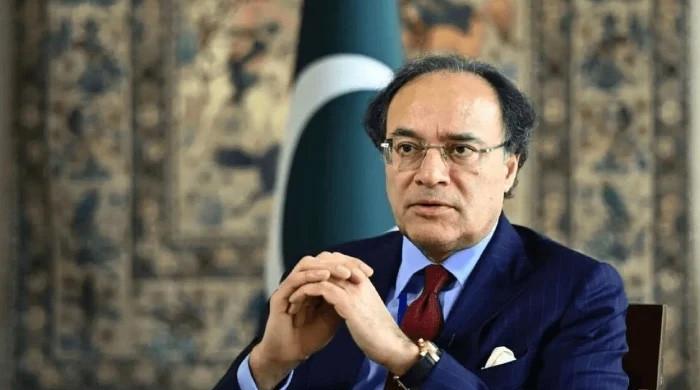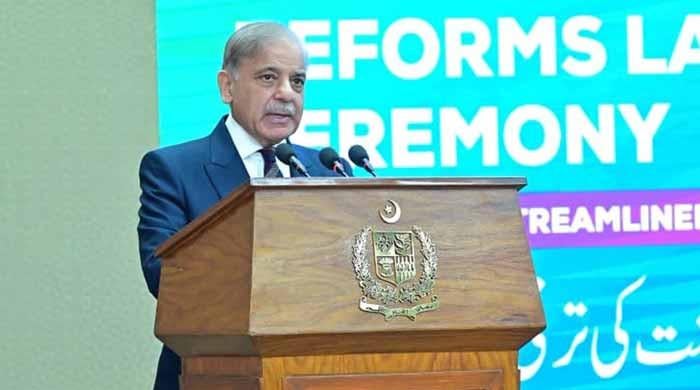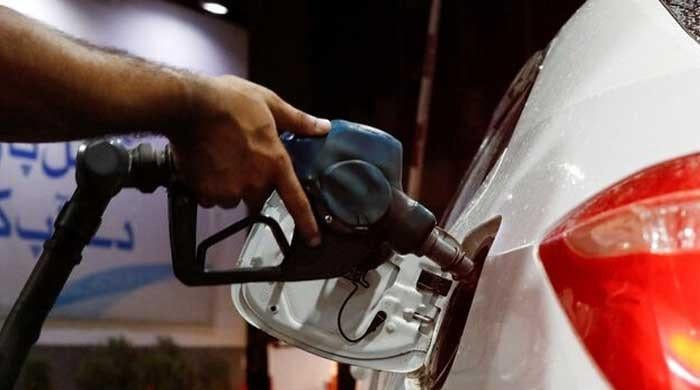'Can't do much' about Rs2.7tr debt repayments, PTI govt doing 'whatever possible': Shaikh
'Certain events intervened, such as the coronavirus, but I also don't wish to blame everything on coronavirus,' says PM's aide
June 14, 2020
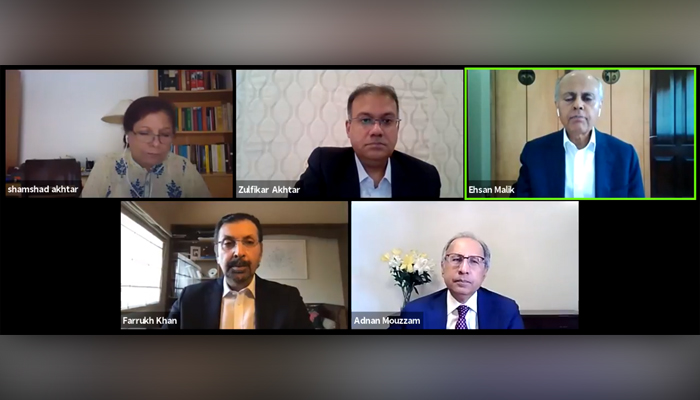
ISLAMABAD: Adviser to the Prime Minister on Finance Dr Abdul Hafeez Shaikh said Sunday the PTI-led government was doing whatever was possible given the current circumstances, especially the coronavirus pandemic.
Speaking in a live session titled "CPG Dialogue: Federal Budget 2020-21" on video-conferencing app Zoom, Dr Shaikh said the government had significantly reduced its expenditures and that the primary balance had entered the green territory for the first time.
Shaikh said the federal government's revenue was Rs2 trillion and that Rs2.7 trillion would be spent on debt repayment next year. "I can't do much about it," he commented.
Some 60% of the revenue is paid to the provinces, he added.
The adviser, who joined the session later due to a prior commitment, said former finance minister Miftah Ismail was "busy defending the previous government" — under the PML-N — during his absence.
Miftah Ismail calls for 'national dialogue'
The former finance minister noted that when the PML-N government was voted out of power, Pakistan's growth rate was 5.5%. He criticised the incumbent PTI leadership for collecting Rs3.9 trillion against a targeted Rs5.5 trillion, asking where would the additional tax of Rs1 trillion come from.
The PML-N leader also explained that there was forecast of negative 4% GDP growth. "The government should try to increase taxes through a mini-budget," he advised.
Stressing how national debt had grown from Rs14 trillion during the PPP tenure to Rs24.9 trillion under the PML-N leadership and to Rs35 trillion, as of March, under the current PTI regime, he said debt was growing too fast.
"There should be a national dialogue on this issue," Ismail added.
'Has it happened before?'
Ismail, Dr Shaikh added, had spoken of a shared understanding and bipartisan consensus, "at least a meeting of the minds [over Pakistan's] longstanding issues relating to debt, ever-growing salaries and pension bill of provincial and national government, and human development".
The PML-N leader shared his view on how to take some tough decisions, Dr Shaikh added, noting that he would welcome any movement in the positive direction.
"What's important is what gets done, not what was said," he said, adding that "Miftah is a sweet, smart guy".
On expenditure management, transparency, efficiency of efforts, and better institutional management, the adviser said he was "all for it". He added that the PTI-led government had granted autonomy to the State Bank of Pakistan (SBP).
"Was this ever granted before? No. We have resisted interfering in the workings of the MPC [Monetary Policy Committee]. Has it ever been done that a government's expenses in nominal terms were brought down?"
"Has it happened before? Have the military's expenses ever been put on freeze? Our primary balance was in surplus. Has it happened before?" he asked, once again.
'Don't wish to blame everything on coronavirus'
The adviser went on to say it was not fair not to talk about the past, "that if we're criticised, it's okay, we should listen without losing our cool, without accusing the other person".
"We will look at the fiscal deficit, it won't be a happy number. We have to maintain decorum and professionalism. We need to get on with the SOE [state-owned enterprises] reform.
"As for privatisation, we haven't done so well. We were close to two [privatisation projects] but then certain events intervened, such as the coronavirus but I also don't wish to blame everything on coronavirus."
Pension reform, he added, needed to be urgently addressed and competition commission has to be empowered and motivated so that it can review how market's forces are impacting prices.
Direct and indirect taxes
Noting that there should be better coordination between different sectors and the provinces, Dr Shaikh said: "Sitting in Islamabad, we can only control [prices] to a point; it involves the machinery of the provinces.
"It requires a multi-layered response from the government."
The adviser said there had been a lot of criticism about how Pakistan has more indirect taxes. "We tried last year to increase the number of registered taxpayers and that number was brought to 1.8-2.5 million," he said.
"The situation right now is of a peculiar sort. We can't be aggressive or heavy-handed over the income taxes. A database has been set up and the coordination between the FBR [Federal Bureau of Revenue] and the NADRA [National Database and Registration Authority] has become better," he noted.
Govt's response to pandemic
Dr Shaikh said Adviser to the Prime Minister for Institutional Reforms and Austerity Dr Ishrat Hussain was given responsibility for more reforms in the FBR and for automation with a project of the World Bank.
"It's an area we need to address but now is not exactly the right time," he noted, adding that the government may refocus its attention perhaps in three to six months and form a "much clearer strategy".
He gave an example of the rate being brought down from 14% to 12% as an incentive for point-of-sale (PoS) units, big shops, and trading outposts to join the tax system and connect electronically with the FBR.
The adviser also listed the government's steps to combat the pandemic's economic impact, saying the regime had provided cash to the victims without any political, religious or regional differences, paid the three-month bills of consumers who used less power, and given subsidies worth Rs50 billion to the agriculture sector and utility stores.
Taxes reduced or rescinded, target ambitious
"We have tried to give a balanced budget in the most difficult situation," he said, adding that taxes on thousands of items were reduced or rescinded.
"At least 10 types of withholding taxes have been completely done away with," he said. "The government held the most difficult negotiations with the IMF to give a good package for the construction sector."
He also noted that during the next financial year, subsidies were reduced by Rs100 billion and tax target kept ambitious.
Towards the end, he explained that although there was the "usual political nitpicking, theoretical points not being helpful in practical decision-making, and a repetition of the obvious", he learnt a lot during the session.
"It was a sober reflection and there was legitimate criticism. One is trying to balance in a noisy democracy; there are vested interests and strong forces that do not want one or the other group to succeed," he added.




